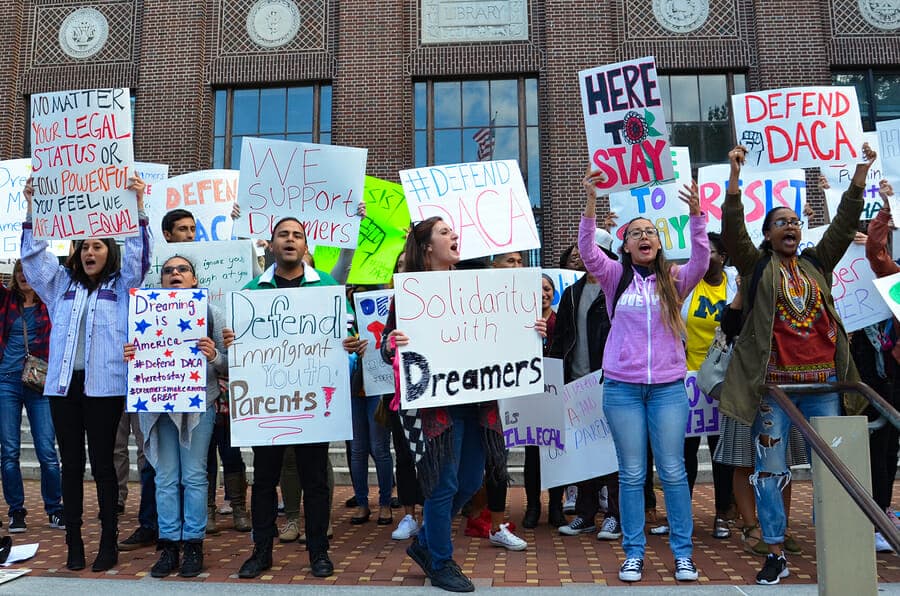“I can’t discover the cure for HIV, but I can hire the person who will.”
One of our recruiters said that to me when I was CHRO at the Bill & Melinda Gates Foundation. It was true at the Foundation, and it is true for your organization — recruitment is the lifeblood of your company.
I am now president of TheDream.US, the nation’s largest college-scholarship program for DREAMers, who are undocumented immigrants who came to this country as children, grew up here, and call it home. In my role, I have come to know a group of young adults who are incredibly talented and determined. Knowing that their families gave up everything to get them to the United States so that they could get a college education and have prosperous lives, DREAMers have an extraordinary sense of responsibility to use their education to improve the well-being of their families, communities, and society as a whole.
Many DREAMers have received DACA (Deferred Action for Childhood Arrivals), which comes with a renewable employment authorization document (EAD). Plus, an EAD is valid for two years and most DACA holders have been diligently renewing their DACA and EAD, particularly given the uncertain environment.
With a college degree and a work permit in hand, DREAMers are eager and ready to launch their careers. But here’s the problem: Employers are sometimes reluctant to hire them because of uncertainty about their status.
3 Important Myths About DREAMers
Our immigration laws are complex, so it’s understandable that employers without the right information might be reticent to hire someone with DACA, particularly given the uncertainty about how the Supreme Court may rule on the future of DACA. That’s what I want to dispel the following myths:
Myth #1: DACA candidates require sponsorship to work in the country legally. In fact, you can hire people with DACA without sponsorship.
Myth #2: Even if candidates have a valid EAD, you can refuse to hire them because of their immigration status. In fact, it is unlawful for an employer to refuse to hire someone with a valid EAD because of their immigration status.
Myth #3: If the Supreme Court rules that the current administration lawfully rescinded DACA, then DACA holders with current EADs can no longer legally work in the country. In fact, despite the Court’s ruling, DACA holders will be able to work here legally until their EADs expire.
Valuable Talent Pools
Employers who don’t understand these facts risk violating the law. Just as importantly, they risk missing out on a tremendous pool of talented employees who are innately entrepreneurial, often multilingual, and come from the very communities that businesses see as part of their growth markets.
Put simply, DREAMers hold what companies seek in their employees: an ability to adapt, an eagerness to learn, and a motivation to succeed borne out of their own stories of perseverance.
Media coverage and briefs filed as part of the recent DACA case before the Supreme Court underscore the contributions of tens of thousands of DREAMers to a diverse group of workplaces across America. Indeed, 143 corporations and business associations (including 18 Fortune 500 companies) have filed a pro-DACA brief with the Court sharing their collective assessments about the value of hiring DACA employees. Here are a couple of quotes from it:
“Dreamers have become essential contributors to American companies and the American economy.”
“Immigrants like DREAMers bring diverse backgrounds and experiences to their workplaces, which bolster their colleagues’ creativity and innovation.”
And in a separate amicus brief to the Supreme Court, Apple CEO Tim Cook and Senior VP of Retail and People Deirdre O’Brien wrote:
“Apple employs 443 Dreamers who come from more than 25 different countries on four continents. We did not hire them out of kindness or charity. We did it because Dreamers embody Apple’s innovation strategy.”
Many employers across America are rooting for the Supreme Court to uphold DACA, but they recognize that even if it rules that the administration legally ended the DACA program, DREAMers will be able to continue to work until their status expires. Furthermore, many of these employers are already pushing Congress to enact permanent protections for DREAMers via long-overdue legislation such as the Dream Act.
Attracting DREAMers
Savvy employers should take note: DREAMers are eager to find meaningful careers. Here’s what you can do to attract this talent:
- Educate your recruiters and hiring managers so that they know that DREAMers with valid EADs are able to work without sponsorship legally.
- Promote that you are a DACA-friendly employer through your website and marketing materials.
- Encourage your DACA employees to spread the word about career opportunities in your company to other DREAMers.
You, too, can be the talent recruiter who finds the person “who can find a cure for HIV.” And it is entirely possible that the person will be a DREAMer.
